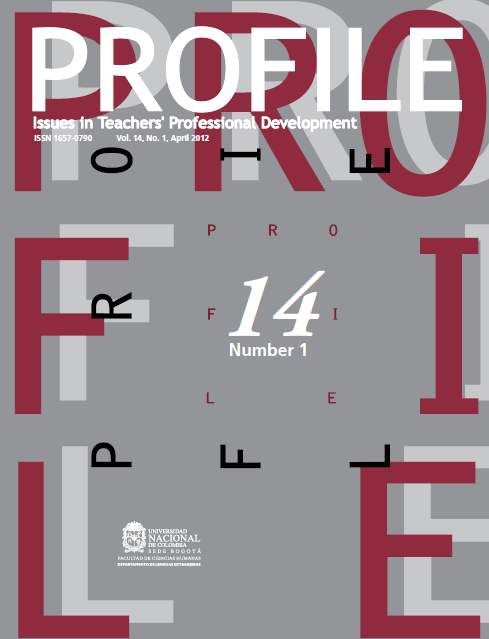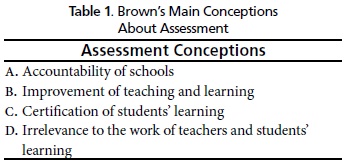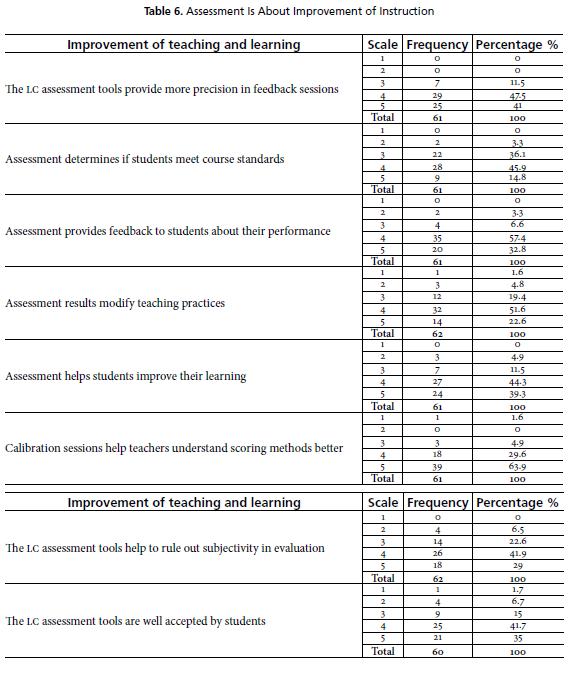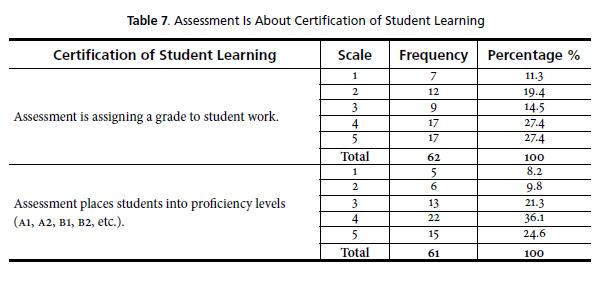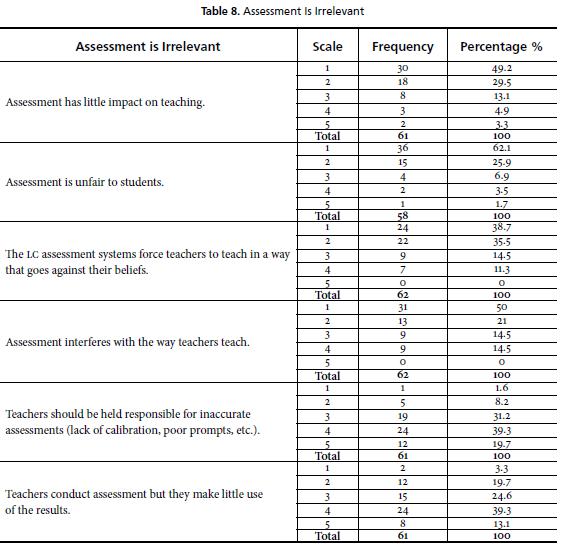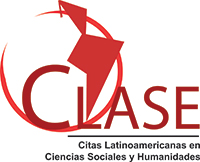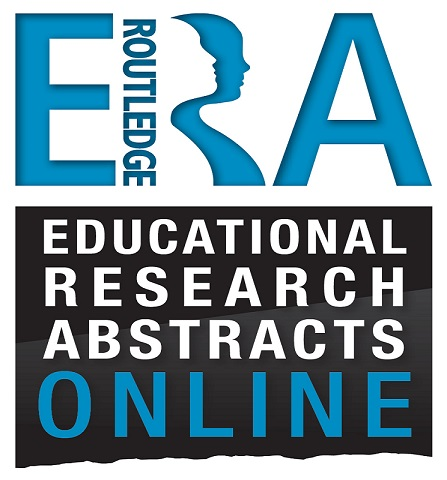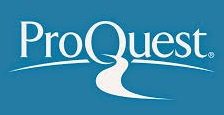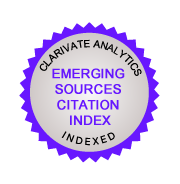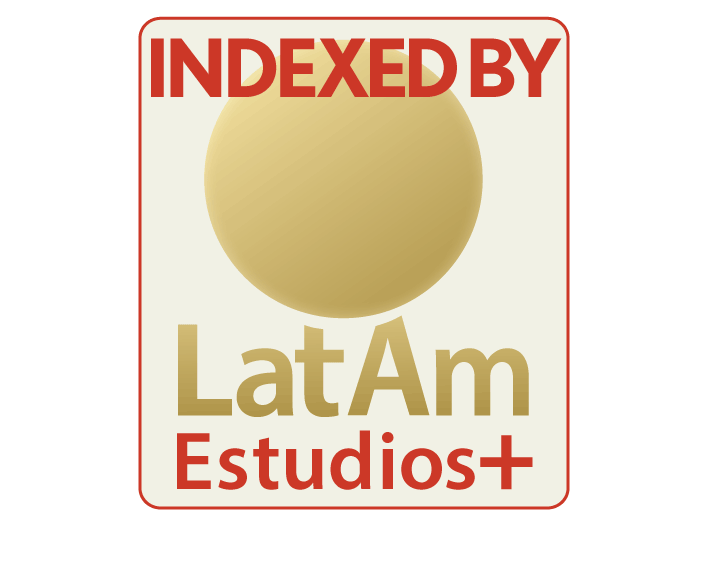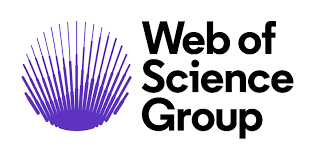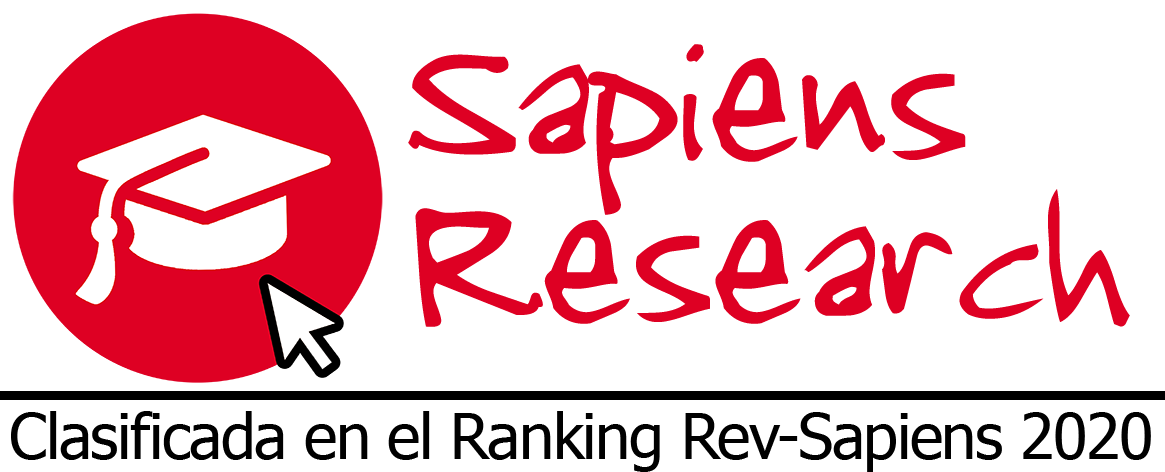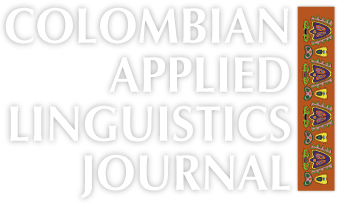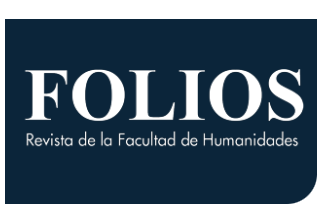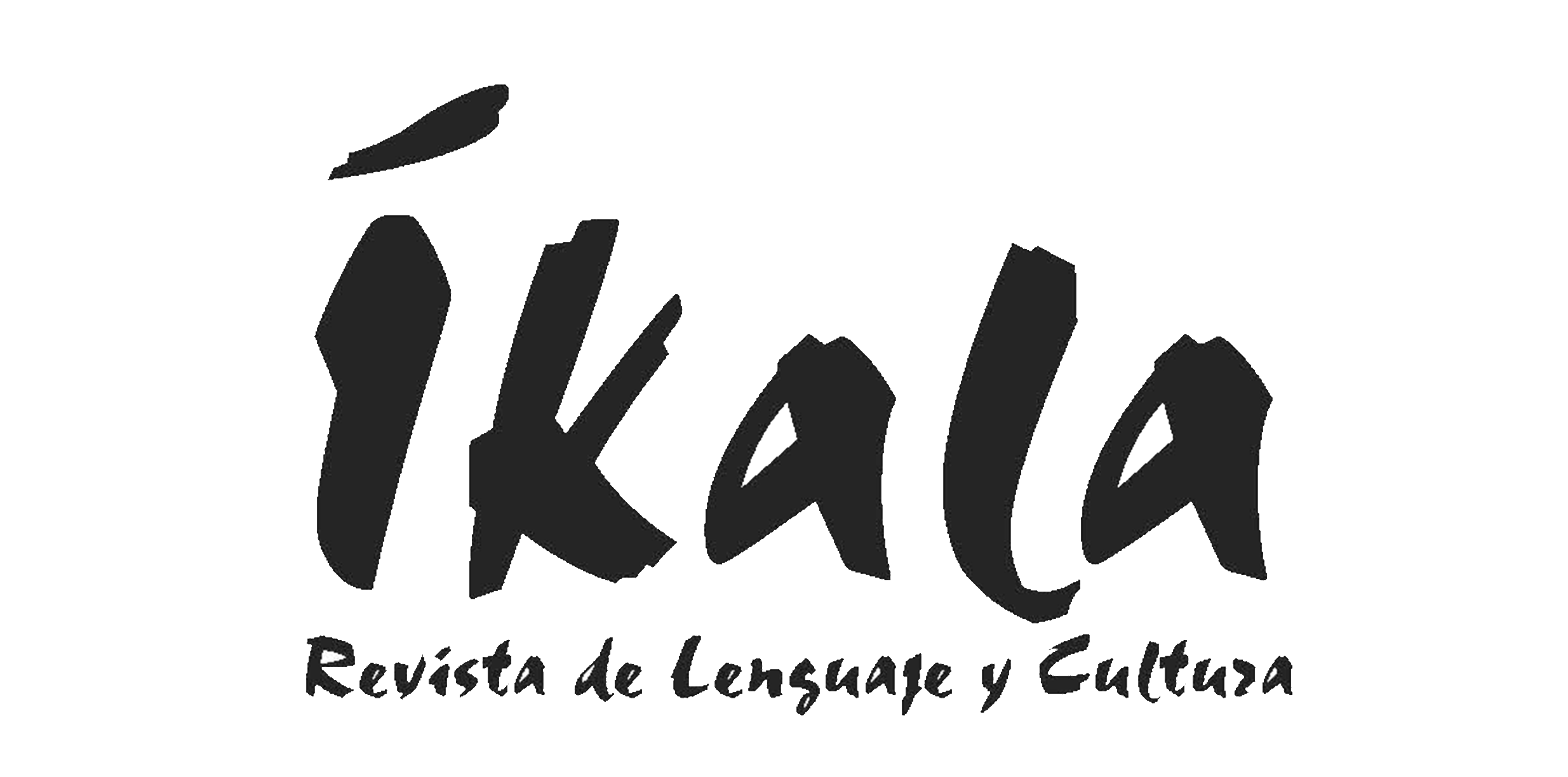Teachers’ Beliefs About Assessment in an EFL Context in Colombia
Creencias de los profesores acerca de la evaluación en un contexto de inglés como lengua extranjera en Colombia
Keywords:
Assessment beliefs, assessment tools, formative assessment (en)Creencias sobre la evaluación, evaluación formativa, instrumentos de evaluación (es)
There is evidence that teachers' beliefs on teaching and learning exert an influence on the way they teach and assess learning, and on what students learn. Therefore, it is central that overt attention is devoted to the perceptions teachers have and how they influence teaching and learning. In this article we describe a study on teachers' beliefs about assessment, in general, and about the assessment systems used at a language center of a private university in Colombia. Surveys, written reports, and interviews were used to research the beliefs of sixty-two teachers. Results indicate a contradiction between what they say they do and what they believe, suggesting that teachers need opportunities for reflection, selfassessment and more guidance on formative assessment practices.
En este artículo describimos un estudio realizado en un centro de idiomas de una universidad privada en Colombia sobre las creencias de los profesores respecto a la evaluación en general y a los sistemas de evaluación que se usan allí. Exploramos las creencias de sesenta y dos profesores mediante encuestas, reportes escritos y entrevistas. Los resultados indican una contradicción entre lo que los profesores dicen hacer y lo que creen. También sugieren que los profesores necesitan oportunidades para la reflexión, la autoevaluación y más orientación en prácticas de evaluación formativa.
Teachers' Beliefs About Assessment in an EFL Context in Colombia
Creencias de los profesores acerca de la evaluación en un contexto de inglés
como lengua extranjera en Colombia
Ana Patricia Muñoz*
Marcela Palacio**
Liliana Escobar***
Universidad EAFIT, Colombia
*apmunoz@eafit.edu.co **opalacio@eafit.edu.co ***lescob17@eafit.edu.co
This article was received on May 31, 2011, and accepted on September 7, 2011.
There is evidence that teachers' beliefs on teaching and learning exert an influence on the way they teach and assess learning, and on what students learn. Therefore, it is central that overt attention is devoted to the perceptions teachers have and how they influence teaching and learning. In this article we describe a study on teachers' beliefs about assessment, in general, and about the assessment systems used at a language center of a private university in Colombia. Surveys, written reports, and interviews were used to research the beliefs of sixty-two teachers. Results indicate a contradiction between what they say they do and what they believe, suggesting that teachers need opportunities for reflection, selfassessment and more guidance on formative assessment practices.
Key words: Assessment beliefs, assessment tools, formative assessment.
Diferentes estudios evidencian que las creencias de los profesores acerca de la enseñanza y el aprendizaje influyen tanto en la manera de enseñar y evaluar como en lo que los estudiantes aprenden. Consecuentemente, es necesario prestar atención a las percepciones de los profesores y a cómo estas influyen en la enseñanza y el aprendizaje. En este artículo describimos un estudio realizado en un centro de idiomas de una universidad privada en Colombia, sobre las creencias de los profesores respecto a la evaluación en general y a los sistemas de evaluación que se usan allí. Exploramos las creencias de sesenta y dos profesores mediante encuestas, reportes escritos y entrevistas. Los resultados indican una contradicción entre lo que los profesores dicen hacer y lo que creen. También sugieren que los profesores necesitan oportunidades para la reflexión, la autoevaluación y más orientación en prácticas de evaluación formativa.
Palabras clave: creencias sobre la evaluación, evaluación formativa, instrumentos de evaluación.
Introduction
A belief is a mental representation of reality which contains meanings, preferences and attitudes that allow the rationalization of complex and different categories of experience including assessment (Kelly, 1991; Thompson, 1992; White, 1994). Teachers' assessments of student behaviour and performance, among others, are shaped by the theories they have in relation to teaching, assessment, and the nature of learning. Therefore, visible attention devoted to the beliefs teachers have and the way in which those beliefs influence teaching are central for professional development (Borko, Mayfield, Marion, Flexer, & Cumbo, 1997).
The purpose of the study reported in this article was to examine teachers' perceptions about assessment, in general, and, in particular, about their beliefs and practices as regards the oral and writing assessment systems developed at the language center (LC) of a private university in Medellín, Colombia. Both systems were implemented in 2005 after formal instruction was provided to get teachers to evaluate applying the same standards, to design assessment tasks, and to give appropriate feedback. The study was conducted three years after the new assessment systems were incorporated in the LC classrooms. After this period researchers intended to observe if the assessment practices promoted by the institution had become part of the teachers' belief system or if they still followed old practices which placed greater emphasis on grades without specific and descriptive criteria for assessment.
The new assessment that the institution pro-motes is both formative and summative. For formative assessment, teachers conduct a series of ongoing assessments such as role-plays, debates, discussions, compositions, journals, etc. to help them identify areas that require further explanation, more practice, and methodological changes. Formative assessment is also intended to provide feedback to students so they can improve their performance. The LC assessment systems also serve summative purposes; student progress is determined through two formal written and oral tests per course and reported at the end in the form of grades.
For assessing the speaking ability of their students, teachers use the Oral Assessment System. The components of this system include: (a) a set of rubrics for different proficiency levels, each of which provides a scoring scale from 1.0 to 5.0, along with performance descriptors for the different aspects of oral language to be assessed, namely: communicative effectiveness, pronunciation, grammar, vocabulary, and task completion; (b) speaking standards for each course; (c) a set of suggested assessment tasks per course; (d) a scoring sheet for teachers to record assessment tasks and grades; (e) a report card that students receive during the midterm and final assessment feedback sessions; and (f) Oral Assessment Guidelines, a document in which the LC oral assessment criteria and procedures are specified (Muñoz, Casals, Gaviria, & Palacio, 2004).
For the assessment of writing, teachers use the Writing Assessment System which consists of a set of writing rubrics aligned with standards to be used for each course. In addition, it contains suggested tasks, writing conventions to check grammar, vocabulary, punctuation, and spelling problems, and the Guidelines for teaching and assessing writing, a document in which the LC writing assessment criteria and procedures are described (Muñoz, Gaviria, & Palacio, 2006).
Since the LC advocates assessment as a means of promoting improvements in instruction, the implementation of the oral and writing assessment systems was intended to influence positively both teaching and learning. Teachers were therefore required to incorporate new assessment practices in their classrooms. They were asked to integrate assessment into instruction and to design tasks that would be used both for collecting information and providing students with feedback. The new assessment practices may have placed new demands on teachers' knowledge and skills and challenged certain beliefs the teachers had about the nature and goals of evaluation. Additionally, since teachers' assessment practices are also influenced by personal experience, education, and social background, they might have seen the proposed changes through the lens of their existing knowledge or experience. Therefore, since beliefs and practices are connected, and teachers may hold beliefs that are not compatible with the practices called for in institutional plans (Bliem & Davinroy, 1997; Borko, et al., 1997), it was essential to investigate those beliefs in order to foster meaningful teacher change in assessment beliefs and practices and to make adjustments, if necessary, to the already implemented assessment systems.
Literature Review
Classroom assessment is guided and influenced by many factors. One of those factors is teachers' beliefs about the nature and goals of assessment. Essentially, the literature has identified two goals of assessment: pedagogical and administrative. The aim of pedagogical assessment is to support and improve learning and teaching thus providing a basis for reflection, discussion and feedback to all those involved in the assessment process. The pedagogical goal of assessment is manifested through formative assessment. This type of assessment guides teacher decision making about future instruction; it also provides feedback to students so they can improve their performance. Stiggins (2007) suggests that the student's role is to strive to understand what success looks like and to use each assessment to try to understand how to do better the next time. Thus, formative assessments help both teachers and students to identify areas that require further work in order to improve instruction and student achievement. Assessment used for administrative purposes aims at informing different stakeholders (teachers, parents, administrators, government agencies, institutions, etc.) of the results of instruction. These results can be used to rank institutions and certify learning, that is, assessment is also used for accountability. The administrative side of assessment is carried out through summative assessment which is usually conducted at the end of a course or unit. It is done through formal testing techniques and is aimed at measuring learners' knowledge and skills.
According to Brown (2003), the conceptions teachers have about the process and purpose of assessment and the nature of teaching and learning affect all pedagogical acts. In his research on teachers' beliefs about assessment, Brown (2002, 2003) found that teachers hold one of four major conceptions of assessment: a) it is useful because it can provide information for improving instruction; b) it is necessary for making students accountable; c) it is necessary for making institutions accountable; and d) it is irrelevant to teaching and learning. If assessment practices rely on teachers' beliefs about the nature and goals of assessment, it is necessary to identify such beliefs in order to arrive at a shared understanding of assessment and to see if there are disagreements between teachers' conceptions and the assessment initiatives promoted by the institution or by new developments in the field. For instance, Rueda and Garcia (1994) investigated the attitudes and beliefs of three groups of third and fourth grade classroom teachers concerning the reading assessment of Latino language minority students in urban classrooms of California. Results show a discrepancy between the beliefs of teachers and those underlying many of the new educational initiatives in assessment and instruction. In another study, Delandshere and Jones (1999) examined three elementary teachers' con-ceptions about assessment. Results indicate that teachers' beliefs are shaped by externally defined purposes of assessment; by what they perceive as the official school curriculum and their position with regard to subject matter; and by how they understand learning and learners. Brown (2003) also conducted a study among 525 New Zealand primary school teachers to analyze the assessment practices and their relationship to learning, curriculum, and teacher efficacy. The results showed that teachers had multiple, correlated conceptions, and that complex models were needed to understand teachers' thinking about the nature and purpose of assessment, teaching, and curriculum. Brown concludes that to ensure success in the implementation of any new assessment policy or practice, it is necessary to take into account the complex structure of teachers' conceptions of assessment.
These studies highlight the need to establish the connection between what teachers believe about assessment and how these beliefs shape their practices. Since different conceptions lead to different assessment practices, institutional efforts to pro-mote shared understanding of assessment criteria would be pointless if teachers' beliefs are not taken into account. Therefore, it is not only crucial to reveal those beliefs, but also to get teachers' aware of such conceptions in an attempt to foster reflection and guide them toward change.
In the study of teachers' beliefs, different research methodologies have been used. For instance, Woods (1996) recommends varied methods of elicitation such as logs, video-based recall, collection of lesson plans, and interview questions. According to Woods, interview questions should elicit anecdotes about teachers' previous language-learning or teachingrelated experiences and the influence of these experiences on their current practices and views. Eliciting data in the form of narratives or stories, he claims, helps researchers to access information which may not entirely be conscious because teachers may respond to general questions "according to what they would like to believe or would like to show they believe in the interview context" (p. 27).
Other researchers such as Cheung (2000) and Brown (2002) have suggested different models for the study of teacher beliefs. Cheung, for instance, used a curriculum orientation inventory survey consisting of 20 items which were grouped into 4 major conceptions of assessment (i.e. academic, humanistic, technological, and social reconstruction). Brown (2002) developed a Teacher's Conceptions of Assessment (TCoA) inventory based on the assumption that four major purposes were sufficient to understand teacher's beliefs about the purpose of assessment. These purposes were: (a) assessment improves teaching and learning; (b) assessment is about certification of students' learning; (c) assessment demonstrates the quality of schools; and (d) assessment is irrelevant to the work of teacher and students' learning. Brown's conception implies that assessment can be used to inform the improvement of students' own learning and the quality of teaching (Black & Wiliam, 1998; Crooks, 1988). The second conception refers to students' performance in high-stakes examinations for entry in higher levels of education or for graduation requirements. The third is about the uses of assessment to evidence schools and teachers' ability to provide quality instruction. Lastly, the fourth conception is associated with assessment being irrelevant, based on the assumption that teachers know their students and the curriculum and, therefore, there is no need to conduct formal assessment.
In sum, it is important to research teachers' beliefs not only in terms of publicly declared general statements or propositions (interviews, surveys, questionnaires), but in terms of more personal or tacit beliefs, as manifested in specific activities or situations (specific activities, narra-tives, stories, and reports). Using different methods to elicit information will consequently produce data from different contexts, and thereby provide some degree of triangulation.
Research Questions
This study intends to respond to the following research questions:
- What are the LC teachers' current beliefs about assessment in general and about the LC oral and writing assessment systems, specifically?
- Do these beliefs match the assessment practices promoted by the LC?
Method
In this study, teachers' conceptions were examined using Brown's (2002, 2003) four major conceptions of assessment purposes (Table 1). To enquire about these conceptions, researchers used surveys, interviews, and a written report of experiences.
Participants
Sixty two teachers (30 females and 32 males) who work in the LC's adult English program were asked about their beliefs on assessment. They had been working at the institution for an average of eight years each. Tables 2 - 4 present information about their age, native language, and educational background.
Data Gathering Tools
Teachers' Survey
The survey was aimed at exploring beliefs about oral and writing assessment practices. It included 21 statements for which respondents were asked to rate each item on a 5-point scale in terms of their agreement (which ranged from totally agree to totally disagree). The statements were designed to examine the four conceptions about assessment proposed by Brown (2002, 2003) presented in Table 1.
Written Report of Experiences
A writing activity was used to explore teachers' past and current assessment practices. In Part I of the activity, teachers were asked to describe what they did in the past in terms of assessment (techniques, instruments, criteria, record keeping, etc.), and what they do currently. In Part II, teachers were asked to list the three most relevant sources of change and elaborate on the reasons for having changed their assessment practices. The purpose of this activity was to determine if teachers had felt the introduction of the new assessment systems as an imposition from the LC. Responses to the survey and the assessment experiences report helped the researchers understand the context and find common themes to be further developed in interviews.
Interviews
Ten teachers were invited to participate in a 30-minute interview. Due to time constraints and incompatibility of schedules, five accepted the invitation. A semi-structured interview was used to obtain more in-depth information from teachers about the statements provided in the survey. Teachers were given freedom to respond in the language they felt easier to express their ideas. Two researchers conducted the interviews, one asking the questions and the other recording and taking notes.
Data Analysis
The survey was analyzed using descriptive statistics. Part I of the written report was examined through a process of coding, that is, researchers read and reread the data to identify emergent categories and common themes (Bogdan & Biklen, 1998). The categories and themes were not previously established but emerged directly from the data. The analysis was conducted by three researchers (first, each one individually, and then together) in order to reach a consensus and to validate the information. The most common categories identified for Part I were: assessment criteria, assessment techniques, knowledge and experience, and planning. The number of responses under each category was also quantified in order to determine which category was more important. Part II was analyzed by counting and ranking the most commonly mentioned reasons for change. The categories found were professional development, self discovery, and institutional policy.
All the interviews were audio-recorded and transcribed to ensure that the whole interview session was captured and would provide data for analysis. To guarantee their reliability, the transcriptions were compared with the notes taken by one of the researchers. Additionally, the transcriptions were returned to the interviewees for their approval and for clarification, if needed. The analysis was conducted through a process of coding identifying recurrent themes and emergent categories (Bogdan & Biklen, 1998). The three sources of data collection complemented each other in an attempt to triangulate the information and thus present a more valid and reliable picture of teachers' beliefs.
Results and Discussion
Teachers' Survey and Interviews
Tables 5 - 8 present the percentage of agreement with the statements given for each of the four major beliefs about assessment. Respondents indicated their opinion on a scale of 1 to 5, with 5 being "totally agree," and 1 being "totally disagree."
As shown in Table 5, teachers agreed that assessment can be used to account for the LC's quality (55% and 23.3%) and good organization (48.3% and 31.7%). The implicit belief here is that assessment is an accurate way to evaluate the performance of the institution, and thus serves the purpose of accountability.
The majority of teachers, as shown in Table 6, agreed that assessment improves teaching and learning, and that the LC assessment tools are trustworthy. Firstly, the data show that improvement is associated with the description or diagnosis of student performance and achievement as reflected in the statements "Assessment provides feedback to students about their performance," with which 90% of the teachers either agreed or agreed totally; "Assessment helps students improve their learning" (with 44.3% and 39.3% agreement); and "Assessment determines if students meet course standards." Even though most teachers strongly agreed with the latter statement (45.9% and 14.8%), there were also 22 teachers (36.1%) who agreed less strongly with it, or who were uncertain about their opinion.
To obtain more information on the conception of whether or not assessment determines that students meet course standards, the interviewed teachers were asked to provide further explanations. All the teachers explained that although they perceive the students are learning, sometimes the relationship between assessment and standards is not totally direct. They consider that this mismatch may be due to factors such as mixed ability groups, students' learning pace, lack of time and the pressure to comply with the standards.
Secondly, the data show that whereas most teachers agreed that assessment modifies teaching practices (51.6% and 22.6%), 19.4% of the teachers neither totally agreed nor disagreed with this idea. During the interviews, all the teachers referred to assessment as a practice that can, in fact, help them to improve instruction. Some of their comments also included feedback as a way of getting input from students concerning how instruction is going and making modifications in instruction.
Thirdly, Table 6 demonstrates that the concept of improvement is also associated with the precision and objectivity of the assessment tools. The majority of teachers agreed that the LC assessment tools help them to provide more accurate feedback to students (47.5% and 41%), and to be more objective (41.9% and 29%). However, 22.6% of the respondents believe that the assessment instruments allow for subjectivity. This is not a surprising perception since all assessment processes are influenced by a degree of subjectivity. As rightly put by Berlak, Newmann, Adams, Archbald, Burgess, Raven, & Romberg, 1992 (in Broadfoot, 2005),
Every stage of the designing, constructing, managing and administering of assessment instruments —as well as the use of the data to make judgments about the possession of certain knowledge, skills and dispositions— involves human intervention and hence values that, separately and collectively, influence every stage of the assessment process. Assessment is therefore not and can never be a science: it is a craft and a social process. (pp. 128-129)
The belief that the assessment tools are of sufficient quality to be considered reliable and accurate, in addition to the understanding of the assessment criteria and scoring methods (29.6% and 63.9%), led teachers to agree that these instruments are wellaccepted by students (41.7% and 35%). However, further research will be needed to verify students' perception of the assessment instruments.
As can be seen in Table 7, teachers' opinion about assessment as a procedure for giving grades to students' performance is scattered along the scale with slightly greater percentages towards agreement (27.4% and 27.4%). Similarly, there is a great percentage of agreement with the concept that assessment places students into levels (36.1% and 24.6%). However, 21.3% of the teachers neither agreed nor disagreed, indicating uncertainty or doubts.
Based on the results, it could be said that there is a tendency to relate assessment to summative purposes. Nonetheless, the percentages of teachers who agreed with the summative approach are lower than the percentages of teachers who viewed assessment as a tool to be used for formative purposes. This was revealed by the responses to the statements (see Table 6):
- Assessment determines if students meet course standards
- Assessment provides feedback to students about their performance
- Assessment results modify teaching practices
- Assessment helps students improve their learning.
Taking these responses into consideration, we
can say that the belief that assessment serves formative purposes is stronger than the belief that assessment is about summative decisions. The interviewed teachers validate this assumption when they said:What we attempt in an evaluative activity is to look at a student's comprehension of a topic and his capacity to use the language to respond in a given situation. If I am an active part of the teaching process, the evaluative process... well, of the whole process, then why is it necessary for there to be a grade to evaluate the performance of the student, if I know that he is capable of communicating? (Teacher 1)
Many times the grade does not measure how a student's process is going along, which is what is really necessary for us to see. It doesn't reflect the student's process. (Teacher 2)
It's not just a grade. It's a grade that shows a student's process. But if you think of it as "Just give a grade," then it seems to me that what's happening is all about a number, and not about a process in and of itself. (Teacher 4)
Assessment for me is like a follow-up to be done on the student and on his learning process, be it written or oral, depending on what one is evaluating. But it's never about the grade, because many times the student gets nervous and fails just because he's nervous. Still, he really does know. (Teacher 5)
The analysis of the results for Table 8 was carried out considering the lower end of the agreement scale, 1 and 2, as positive responses. This is due to the negative phrasing of the statements. As can be seen, teachers strongly disagreed with the idea that assessment is unfair to students (62.1% and 25.9%) and that it has little effect on teaching (49.2% and 29.5%). It could be said that the belief that assessment has a legitimate place within teaching and learning is strong among the teachers surveyed (see also Table 6). In addition, teachers acknowledged the assessment values promoted in the LC. They did not consider that the assessment systems are imposed by the institution (38.7% and 35.5%) or that these systems interfere with their teaching style (50% and 21%). Three of the interviewed teachers responded to the question, "Do you think the LC assessment system interferes with the way teachers teach?" as follows:
No, it's something that indeed takes time, but to the degree you learn to handle that time and manage the system more quickly, it is more efficient... I think that if all of us teachers were in favor of the evaluation, that is, if in the basic courses we taught the students the criteria, by the time that they got to a higher level, we would be saving each other time. So, this is a team project. (Teacher 4)
Do the rubrics interfere? No, but it depends on how one manages them. They have to be used in an interactive way, because there are some students who get to an advanced course with no idea about how the rubrics work. (Teacher 5)
The previous quotes demonstrate that teachers hold that the assessment systems do not interfere with teaching practices, but rather, that these systems help them involve students in the assessment process, even in self-assessment. The implicit belief demonstrated by the interviews is that the LC assessment methods do not have detrimental effects on teacher autonomy and professionalism. It could also be deduced that the LC assessment policies do not create tensions between teachers and the institution.
Nonetheless, 14.5% of the teachers asserted that the assessment systems interfere with teaching. Likewise, 14.5% partially agreed with that same statement. A possible explanation for this belief was provided by the interviewed teachers. They made it clear that time constraints and the need to comply with administrative duties -such as grading and attending meetings- are factors that hinder the flexible application of the systems. More concretely, they made reference to the administration of the mid-term and final written exams which constitute 60% of the total points needed to pass a course. They clarified, however, that the oral and writing assessment systems lend themselves to greater adaptability and therefore do not create interference.
Teachers strongly agreed with the statement to the effect that they are the ones responsible for providing accurate assessments (39.3% and 19.7%). The institution offers on-going teacher development opportunities to familiarize teachers with the assessment criteria and scoring procedures. At least partly due to this practice, it seems that teachers have internalized assessment as their own responsibility and, consequently, it has become more relevant to their work.
When asked about the uses of assessment results, 39.3% and 13.1% of the teachers agreed that they make little use of the results. Furthermore, 24.6% showed partial agreement. This finding seems to contradict teachers' (generally positive) perception of assessment as a way to improve and modify teaching and learning (see Table 6). A possible explanation for the contradiction is the discrepancy, evidenced in the literature, between what teachers believe and what they actually do in the classroom (Tatto & Coupland, 2003; Breen, Hird, Milton, Oliver & Thwaite, 2001). In fact, it is likely that the LC teachers believe in assessment as a means for improvement while, at the same time, they are not yet able to use the assessment results in a practical way.
Written Report of Experiences
Past and Current Assessment Practices
The 62 teachers surveyed were prompted to think about their first years of teaching at the LC and to describe what they did then (hence the use of "then") and what they are doing at present (hence, the use of "now") in terms of techniques, instruments, criteria, record keeping, etc. Upon reaching a consensus among researchers, they found the analysis of information rendered four overt categories for both "then" and "now": assessment criteria, assessment techniques, knowledge and experience, and planning.
Assessment criteria, the category that garnered the greatest proportion of positive responses (61%), refer to the assessment tools and principles specified by the LC to measure students' performance. Overall, respondents suggested that there was a lack of consistent criteria and objective assessment instruments in the past. Teachers commented that assessing in the past was arbitrary:
Only personal criteria, mostly making things up (Teacher 31). Very intuitive techniques (Teacher 54). We didn't have rubrics, so my criteria were very different (Teacher 22). Some grades were based on assumption (Teacher 13). Assessing then was a more subjective experience, and the factors I took into account were very varied (Teacher 17).
In contrast, assessment tools, particularly rubrics, were highlighted as beneficial for accuracy in grading "now" (63% of the responses):
Objective point of view to grade students' written process (Teacher 5).
Assessing is harder but the process makes it much more objective (Teacher 17).
Much better in terms of criteria and tools (Teacher 12).
I constantly use the rubrics to grade my students (Teacher 22).
More accurate in grading with the rubrics (Teacher 58).
More academic criteria (Teacher 54).
Score every descriptor for each aspect in the rubric (Teacher 15).
These comments confirm, once again, teachers' positive attitude toward the assessment systems. They demonstrate teachers' growing confidence in assessment and a new certainty that they can be more precise while grading the students.
The second largest grouping that teachers responded favorably to, assessment techniques, deals with the different assessment practices teachers use to determine students' progress. The greatest percentage of responses (63%) under the "then" heading showed traditional techniques such as gap-fill quizzes, multiple choice tests, standard quizzes, or midterm and final exams. Under the "now" heading, 58% of the responses referred to activities such as communicative-centered tests, content-based tests, evaluation of a combination of content and structure, or a variety of activities to assess. Although a small difference is perceived between past and current assessment techniques, teachers were more able to name traditional assessment tasks than they were to identify communicative assessment methods. The teachers' reference to standardized testing versus more alternatives to assessment such as discussion, role-plays, portfolio, and peer or self-assessment techniques is noteworthy. A logical conclusion is that teachers need to be better equipped, through education programs, for implementing a wide repertoire of procedures of assessing students' performance that goes beyond traditional test formats.
Twenty nine percent of the responses grouped under "then" in the knowledge and experience category, had to do with the limited information and lack of experience teachers had in the past. Some teachers expressed a "lack of ability to let students know where they were in their learning process" (Teacher 37) or they "didn't know clearly what to tell students" (Teacher 21). Some others said they had few ideas on what to do or that they used to pay little attention to assessment and feedback. In contrast, responses classified under "now" (32%) showed more awareness and understanding of assessment:
Everything (techniques, criteria) has developed in a positive way. I now know and do things better (Teacher 43). I assess and analyze results with students and determine strategies to improve their performance (Teacher 61). The students are sure about where they are in their learning process (Teacher 37). I give feedback throughout the course (Teacher 15).
Such comments reiterate the fact that some teachers have gained great confidence in the use of LC assessment practices. Moreover, it seems that these teachers view assessment as an instrument to be used for formative purposes.
The least frequent comments were related to planning (numbers 6 and 7 under "then" and "now," respectively). Teachers recognize planning was "more immediate and closer to the date" (Teacher 6)in the past, as opposed to "spending time planning assessment" (Teacher 19) or "planning way ahead of time" (Teacher 6) now. Such responses reveal a positive attitude towards planning assessment, which is believed to be a tool used to address students' needs and proficiency level.
Reasons for change
The 62 teachers cited three basic reasons for having changed their assessment practices: professional development, self discovery, and institutional policy.
A total of 69% of the responses correspond to change due to professional development programs such as in-service workshops, seminars, conferences, and scoring calibration sessions. According to respondents, teacher education is the main rea-son that leads to change in practices and beliefs. Most of them comment that in-service courses offered by the LC give them new ideas and help them to improve different aspects of their pedagogical skills e.g. assessing in a more objective way, implementing better teaching techniques, and class management strategies.
Continuous education is crucial to my own discovery and growth (Teacher 7). Courses at university, seminars, conferences and in-service courses have been quite useful for my professional development, there is always something new to learn (Teacher 24). Attending courses and workshops is very important for me and I always find something new to start dealing with (Teacher 28).
Self-discovery comes next as a reason for change (63% of the responses). Most of the responses within this category also mentioned student feedback as a reason for change, which can be regarded as dual: receiving feedback from and giving feedback to students. The process of giving feedback to students raises teachers' awareness of educational dimensions that need change such as assessment practices. This awareness is possible thanks to the interactions that exist between teacher and students. The spoken or written word that occurs in the classroom during feedback sessions or during a lesson is evidently what triggers a consciousness of the need for change. These interactive moments create crucial opportunities for both students and teachers to engage in a process of self-discovery.
In a similar way, feedback from supervisors and colleagues can also trigger change. Any academicsphere communication may lead to a teacher's reflection upon current practices. Twenty-six percent of the responses make reference to feedback from supervisors as a reason for change.
The aforementioned beliefs suggest that selfdiscovery through feedback from different sources constitutes a significant factor in teachers' reasons for having changed their assessment practices. According to Richards, Gallo and Renandya (2001), change is a major dimension of teachers' professional lives. However, this change manifests itself through modifications in teaching practices, adjustments of techniques, and awareness. As teachers become more aware of their beliefs and the way these become evident in their teaching, they will be more able to change their beliefs and practices in a constructive and beneficial way. Batten (1991, p. 295) claims that if teachers are "encouraged to identify and reflect on the positive aspects of their teaching," then positive change will come along.
Finally, institutional policies constitute another catalyst for change. Many times teachers must adapt their practices and beliefs to the context in which they work. Twenty-four percent of the responses, including those which mentioned the use of rubrics and compliance with institutional requirements, point to institutional policies as a reason for change. We can interpret this to mean that teachers must change at least as many times as their institution establishes new educational policies. However, the main catalyst that was named for change was teacher education initiatives (in-service courses, seminars, and conferences) followed by self-discovery, including feedback to and from both students and supervisors. Institutional policies constitute the last motivation for change.
Limitations
A clear limitation of this study is the difficulty of researching the issue of beliefs. Personal values are hard to conceptualize because in many situations they are unconscious constructs. On the other hand, another difficulty arises regarding the veracity of teachers' responses. In an attempt to remain in good standing with the institution, teachers may not have wanted to express adverse opinions about the assessment systems used there.
A further limitation was investigating teachers' conceptions of assessment in isolation from their conceptions of teaching, learning, and curriculum. How assessment is conceived, and how those conceptions relate to those of teaching, curriculum, and learning, is relatively unexplored (Dahlin, Watkins, & Ekholm, 2001), constituting a topic for further research. Likewise, additional research is necessary to correlate variables such as age, native language, years of experience, and educational background with beliefs. These factors were not considered in this current study due to time constraints.
Conclusions and Implications
In response to the research question: What are teachers' current beliefs about assessment in general and about the LC oral and writing assessment systems? The following can be concluded: the LC teachers believe that teaching and learning can improve with help from assessment and, as a result, they reject the conception of assessment being irrelevant. Although teachers acknowledge the importance of assessment for accountability and certification purposes, they mainly view it as a means for academic improvement. In fact, it is clearly a belief among teachers that assessment serves formative purposes. Assessment is viewed as a process of educational regulation in which teachers recognize the changes that need to be made to improve their teaching practices, and in which they introduce more meaningful learning activities. However, even though the conception of assessment for improvement is a strongly manifested belief, there is a tendency towards using summative procedures in the classroom as evidenced by both teachers' comments on the use of traditional assessment techniques and a lack of ability in applying assessment results for improvement purposes. Therefore, a possible discrepancy between beliefs and reported assessment practices might be revealed. Nonetheless, further research, by means of observations and other data gathering sources, would be necessary to deepen our understanding of the connection between teachers' beliefs and classroom reality. Additionally, it is necessary to offer teachers professional development opportunities focused on reflection and self-assessment that allow them to become aware of their own beliefs in an attempt to bridge the gap between conceptions and practices. As pointed out by Kahn (2000), implementing new standards in assessment may be pointless if teachers' conceptions about assessment remain the same and unquestioned, especially if teachers continue to be unaware of their own beliefs.
Professional development programs also need to be accompanied by stronger efforts from the institution in order to foster formative assessment not just in theory but, more importantly, in practice. With regard to this view, the works of Black and Wiliam (2003) and Black, Harrison, Lee, Marshall, and Wiliam (2003) can be outstanding referents. These researchers have long worked with the idea of assessment for learning, another term for formative assessment, where the first priority in assessment design and practice is to serve the purpose of promoting students' learning. Therefore it differs from assessment which is mainly designed to serve the purposes of accountability, ranking, or certifying competence (Black & Wiliam, 2003).
There is a need for promoting formative assessment techniques, such as peer and self-assessment, that can help teachers assess their students more in accordance with the heartfelt convictions of the institution and the instructors and that can better adjust to the actual needs of the classroom. In sum, it is important to minimize assessment which is associated with summative goals and, rather, to assure that assessment relates more closely with each teacher's individual ability to improve results in teaching and learning.
In relation to whether teachers' beliefs match the assessment practices promoted by the LC, results indicate that teachers value the principles promoted by the institution. They consider that the oral and writing assessment systems do not interfere with their teaching style and that these do not harm teacher autonomy. Furthermore, they view the institutional policies as the last factor influencing their beliefs about assessment practices. Teachers' acceptance of the systems is likely due to the trustworthiness of the assessment criteria and tools. They said they find rubrics to be particularly beneficial for improving assessment accuracy. Teachers also acknowledge the benefits of professional development programs as the main element that leads to changes in practice. In addition, self-discovery through feedback from different sources constitutes a significant factor in teachers' conceptions of assessment. These findings underscore the significant role professional development programs that emphasize reflection and awareness can play. Such programs allow for teachers to have the opportunity to interact with each other to share experiences.
Finally, as a recommendation, if institutions want to move teachers into a preferred system of beliefs about assessment, it is crucial to take account of their pre-existing conceptions. A study of teachers' beliefs about assessment can allow researchers, policy makers, and teacher-educators to delve into the factors that may contribute to use assessment as a means of improving teaching and learning standards.
References
Batten, M. (1991). Identification and development of teachers' professional craft knowledge. In W. K. Ho, & R. Wong (Eds.), Improving the quality of the teaching profession: An international perspective (pp. 295-305). Singapore: Institute of Education.
Black, P., & Wiliam, D. (1998). Assessment and classroom learning. Educational Assessment: Principles, Policy and Practice, 5(1), 7-74.
Black, P., & Wiliam, D. (2003). The development of formative assessment. In B. Davis & J. West-Burnham (Eds.), International Handbook of Educational Leadership and Management (pp. 409-18). London: Pearson.
Black, P., Harrison, C., Lee, C., Marshall, B., & Wiliam, D. (2003). Assessment for learning: Putting it into practice. Buckingham: Open University Press.
Bliem, C. L., & Davinroy, K. H. (1997). Teachers' beliefs about assessment and instruction in literacy. CSE technical report 421. Los Angeles, CA: University of California.
Bogdan, R. C., & Biklen, S. K. (1998). Qualitative research for education: An introduction to theory and methods. Needham Heights, MA: Allyn & Bacon.
Borko, H., Mayfield, V., Marion, S., Flexer, R., & Cumbo, K. (1997). Teachers' developing ideas and practices about mathematics performance assessment: Successes, stumbling blocks, and implications for professional development. Teaching & Teacher Education, 13, 259-278.
Breen, M., Hird, B., Milton, M., Oliver, R., & Thwaite, A. (2001). What is the relationship between ESL teachers' pedagogic principles and their classroom practices? Applied Linguistics, 22(4), 502-530.
Broadfoot, P. (2005). Dark alleys and blind bends: Testing the language of learning. Language Testing, 22(2), 123-141.
Brown, G., T. L. (2002). Teachers' conceptions of assessment (Unpublished doctoral dissertation). University of Auckland, New Zealand.
Brown, G. T. L. (2003). Teachers' instructional conceptions: Assessment's relationship to learning, teaching, curriculum, and teacher efficacy. Paper presented at the Joint Conference of the Australian and New Zealand Associations for Research in Education, Auckland, New Zealand.
Cheung, D. (2000). Measuring teachers' meta-orientations to curriculum: Application of hierarchical confirmatory analysis. Journal of Experimental Education, 68(2), 149-165.
Crooks, T. (1988). The impact of classroom evaluation practices on students. Review of Educational Research, 58(4), 438-481.
Dahlin, B., Watkins, D. A., & Ekholm, M. (2001). The role of assessment in student learning: The views of Hong Kong and Swedish lecturers. In D. A. Watkins & J. B. Biggs (Eds.), Teaching the Chinese learner: Psychological and pedagogical perspectives (pp. 47-74). Hong Kong: University of Hong Kong, Comparative Education Research Centre.
Delandshere, G., & Jones, J. H. (1999). Elementary teachers' beliefs about assessment in mathematics: A case of assessment paralysis. Journal of Curriculum and Supervision, 14(3), 216-240.
Kahn, E. A. (2000). A case study of assessment in grade 10 English course. The Journal of Educational Research, 93, 276-286.
Kelly, G. A. (1991). The psychology of personal constructs: A theory of personality (Vol. 1). London: Routledge.
Muñoz, A., Casals, S., Gaviria, S., & Palacio, M. (2004). Guidelines for oral assessment. Cuadernos de Investigación Doc. 23. Medellín: Universidad EAFIT.
Muñoz, A., Gaviria, S., & Palacio, M. (2006). Guidelines for teaching and assessing writing. Cuadernos de Investigación Doc. 48. Medellín: Universidad EAFIT.
Richards, J. C., Gallo, P. B., & Renandya, W. A. (2001). Exploring teachers' beliefs and the processes of change. The PAC Journal, 1(1), 43-64.
Rueda, R., & Garcia, E. (1994). Teachers' beliefs about reading assessment with Latino language minority students. Center for Research on Education, Diversity & Excellence. NCRCDSLL Research Reports. Berkeley, CA: University of California.
Stiggins, R. (2007). Assessment through the student's eyes. Educational Leadership, 64(8), 22-26.
Tatto, M. T., & Coupland, D. B. (2003). Teacher education and teachers' beliefs: Theoretical and measurement concerns. In J. Rath & A. C. McAninch (Eds.), Advances in teacher education series, 6 (pp. 123-181). Greenwich, CT: Information Age.
Thompson, A. G. (1992). Teachers' beliefs and conceptions: A synthesis of the research. In D. A. Grouws (Ed.), Handbook of research in mathematics teaching and learning (pp. 127-146). New York, NY: MacMillan.
White, R. T. (1994). Commentary: Conceptual and conceptional change. Learning and Instruction, 4, 117-121.
Woods, D. (1996). Teacher cognition in language teaching. Cambridge: Cambridge University Press.
About the Authors
Ana Patricia Muñoz is the coordinator of Research and Teacher Education Unit in the Language Center, Universidad EAFIT, Medellín, Colombia. She holds an MA in TESOL from Eastern Michigan University, USA. Her current research interests cover assessment, evaluation, and motivation.
Marcela Palacio is the Academic Assistant of the adult English program at the Language Center, Universidad EAFIT, Medellín, Colombia. She holds a BA in Languages from the Universidad de Antioquia, Colombia. She has been an English teacher and researcher for more than 12 years. Her current research interests cover assessment, evaluation, and motivation.
Liliana Escobar is an English Teacher at the Language Center, Universidad EAFIT, Medellín, Colombia. She holds an MBA with a specialization in Management of Information Systems from Nova Southeastern University, USA and a Master in Sciences de l'Éducation from Université La Sorbonne (Paris V), France.
References
Batten, M. (1991). Identification and development of teachers' professional craft knowledge. In W. K. Ho, & R. Wong (Eds.), Improving the quality of the teaching profession: An international perspective (pp. 295-305). Singapore: Institute of Education.
Black, P., & Wiliam, D. (1998). Assessment and classroom learning. Educational Assessment: Principles, Policy and Practice, 5(1), 7-74.
Black, P., & Wiliam, D. (2003). The development of formative assessment. In B. Davis & J. West-Burnham (Eds.), International Handbook of Educational Leadership and Management (pp. 409-18). London: Pearson.
Black, P., Harrison, C., Lee, C., Marshall, B., & Wiliam, D. (2003). Assessment for learning: Putting it into practice. Buckingham: Open University Press.
Bliem, C. L., & Davinroy, K. H. (1997). Teachers' beliefs about assessment and instruction in literacy. CSE technical report 421. Los Angeles, CA: University of California.
Bogdan, R. C., & Biklen, S. K. (1998). Qualitative research for education: An introduction to theory and methods. Needham Heights, MA: Allyn & Bacon.
Borko, H., Mayfield, V., Marion, S., Flexer, R., & Cumbo, K. (1997). Teachers' developing ideas and practices about mathematics performance assessment: Successes, stumbling blocks, and implications for professional development. Teaching & Teacher Education, 13, 259-278.
Breen, M., Hird, B., Milton, M., Oliver, R., & Thwaite, A. (2001). What is the relationship between ESL teachers' pedagogic principles and their classroom practices? Applied Linguistics, 22(4), 502-530.
Broadfoot, P. (2005). Dark alleys and blind bends: Testing the language of learning. Language Testing, 22(2), 123-141.
Brown, G., T. L. (2002). Teachers' conceptions of assessment (Unpublished doctoral dissertation). University of Auckland, New Zealand.
Brown, G. T. L. (2003). Teachers' instructional conceptions: Assessment's relationship to learning, teaching, curriculum, and teacher efficacy. Paper presented at the Joint Conference of the Australian and New Zealand Associations for Research in Education, Auckland, New Zealand.
Cheung, D. (2000). Measuring teachers' meta-orientations to curriculum: Application of hierarchical confirmatory analysis. Journal of Experimental Education, 68(2), 149-165.
Crooks, T. (1988). The impact of classroom evaluation practices on students. Review of Educational Research, 58(4), 438-481.
Dahlin, B., Watkins, D. A., & Ekholm, M. (2001). The role of assessment in student learning: The views of Hong Kong and Swedish lecturers. In D. A. Watkins & J. B. Biggs (Eds.), Teaching the Chinese learner: Psychological and pedagogical perspectives (pp. 47-74). Hong Kong: University of Hong Kong, Comparative Education Research Centre.
Delandshere, G., & Jones, J. H. (1999). Elementary teachers' beliefs about assessment in mathematics: A case of assessment paralysis. Journal of Curriculum and Supervision, 14(3), 216-240.
Kahn, E. A. (2000). A case study of assessment in grade 10 English course. The Journal of Educational Research, 93, 276-286.
Kelly, G. A. (1991). The psychology of personal constructs: A theory of personality (Vol. 1). London: Routledge.
Muñoz, A., Casals, S., Gaviria, S., & Palacio, M. (2004). Guidelines for oral assessment. Cuadernos de Investigación Doc. 23. Medellín: Universidad EAFIT.
Muñoz, A., Gaviria, S., & Palacio, M. (2006). Guidelines for teaching and assessing writing. Cuadernos de Investigación Doc. 48. Medellín: Universidad EAFIT.
Richards, J. C., Gallo, P. B., & Renandya, W. A. (2001). Exploring teachers' beliefs and the processes of change. The PAC Journal, 1(1), 43-64.
Rueda, R., & Garcia, E. (1994). Teachers' beliefs about reading assessment with Latino language minority students. Center for Research on Education, Diversity & Excellence. NCRCDSLL Research Reports. Berkeley, CA: University of California.
Stiggins, R. (2007). Assessment through the student's eyes. Educational Leadership, 64(8), 22-26.
Tatto, M. T., & Coupland, D. B. (2003). Teacher education and teachers' beliefs: Theoretical and measurement concerns. In J. Rath & A. C. McAninch (Eds.), Advances in teacher education series, 6 (pp. 123-181). Greenwich, CT: Information Age.
Thompson, A. G. (1992). Teachers' beliefs and conceptions: A synthesis of the research. In D. A. Grouws (Ed.), Handbook of research in mathematics teaching and learning (pp. 127-146). New York, NY: MacMillan.
White, R. T. (1994). Commentary: Conceptual and conceptional change. Learning and Instruction, 4, 117-121.
Woods, D. (1996). Teacher cognition in language teaching. Cambridge: Cambridge University Press.
How to Cite
APA
ACM
ACS
ABNT
Chicago
Harvard
IEEE
MLA
Turabian
Vancouver
Download Citation
Article abstract page views
Downloads
License
Copyright (c) 2012 Ana Patricia Muñoz, Marcela Palacio, Liliana Escobar

This work is licensed under a Creative Commons Attribution-NonCommercial-NoDerivatives 4.0 International License.
You are authorized to copy and redistribute the material in any medium or format as long as you give appropriate credit to the authors of the articles and to Profile: Issues in Teachers' Professional Development as original source of publication. The use of the material for commercial purposes is not allowed. If you remix, transform, or build upon the material, you may not distribute the modified material.
Authors retain the intellectual property of their manuscripts with the following restriction: first publication is granted to Profile: Issues in Teachers' Professional Development.



